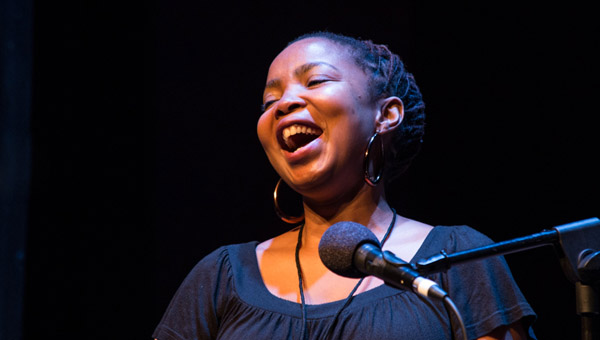A Renegade Called Simphiwe, 8 September 2013, Fugard Studio. Grace Musila interviews Pumla Gqola.
MARIA GEUSTYN
Pumla Gqola describes her newest book, A Renegade Called Simphiwe, as “the kind of book [she] would like to read. When Grace Musila asks her, “why Simphiwe Dana”, her response is simply, “for a combination of reasons”. Gqola describes Dana as a genius and a game-changer. “She alters South Africa’s musical and cultural landscape”, not only in the various ways in which she occupies South Africa’s public consciousness and space, but also the varied ways in which different publics and different audiences respond to her. “She doesn’t fit into one category of any of the various things she’s supposed to be. She’s not a musician who feels limited to only speak about musical matters.” This, Gqola notes, is compelling in the current South African context as society “produces these women who are outspoken and unafraid, but at the same time is very uncomfortable with precisely these [constructions]”.
This leads Musila to reflect on the strange nature of South Africa as a space which is simultaneously very restrictive and hosts problematic ideas and attitudes towards women, yet provokes and inspires rich, creative imagery. “The untidy inheritance of living in South Africa at this time” is therefore marked by very successful women’s movements that produce “the creative, crazy, brilliant, daring, playful renegade[s]”, yet simultaneously, masculinity and patriarchy manifest “in the violent policing of women’s bodies”. “And”, says Gqola, “I am starting to wonder why we don’t have more of these feminists” as they seem to be a product of this masculinist backlash. Subsequently, this ambivalence affects men and their construction of gender in that men experience “pressure to perform certain kinds of violent masculinities in public”.
Musila moves the discussion to genre and the “conversational nature” of the book. In response, Gqola mentions that there’s a certain kind of reluctance to engage with cultural figures imaginatively: “We either write coffee-table books or theses about cultural figures.” She reminds us that “intellectual engagement is not the exclusive domain of the academy”, and that A Renegade Called Simphiwe stems from her various forms of academic training, but also her position as writer, rather than scholar. Thus, she imagined herself “in conversation with Dana”, a form of writing she found “incredibly freeing”. Musila points out that this leads to elements of Gqola herself encapsulated in the text and is arguably as much “a portrait in words” of Dana as it is of Gqola. “It was important to me to engage as a writer and not a scholar”, replies Gqola. She mentions that she finds herself thinking increasingly about “conversations between different creative genres and presences, and that [the book] is a conversation with a certain kind of South African” that attempts to open different responses and different ways of reading it. Pleasure as a space of critical consciousness is subsequently discussed, as public talk of creative space is popularly considered frivolous. To Gqola, ironically, the most provocative thinking is usually in creative form and the most exciting play with gender and sexualities and identities is often creative: “My most moving or life-changing moments have often come as a response to an art installation or music.”
The final point of the afternoon’s discussion centres around Dana’s position as “soft feminist” which, as Musila points out, seems to be an uneasiness with the label of “feminist” yet unavoidably forms part of Simphiwe Dana’s “contradictions”. Gqola closes with a passage from the book on reading Dana as “thinking against the grain” and “encouraging an intellectual and political stance which functions differently from the dominant messages that black girls and women are given about themselves, about ourselves in contemporary South Africa and beyond”.
Questions from the floor are posed: from requests concerning the definition of “soft-feminism” to what Dana thinks of the book. The most thought-provoking question comes from a young gentleman, who inquires as to the possibility of engaging with Simphiwe Dana as a feminist in the various forms she occupies, within the context of “rising public masculinities”. A question which perhaps calls for a similar fluid or conversational engagement with the contradictory aspects of masculinity, which tends to be presented as rigid and unyielding.
 SLiPStellenbosch Literary Project
SLiPStellenbosch Literary Project 